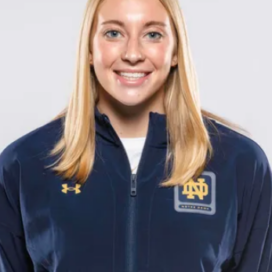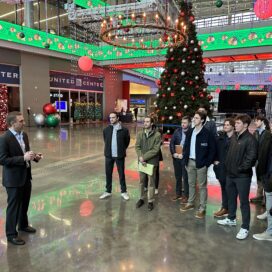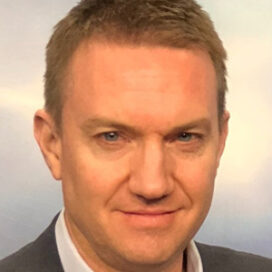Giacobello and Ryan Collaborate with Alumni Association
Author: Marshall King
Analytics Students Collaborate with Alumni Association to Enhance Experience
A group of undergraduate and graduate students collaborated to help those Notre Dame students who have gone before them.
Business Analytics students worked on a project for the Notre Dame Alumni Association, which provided data on its clubs. The Alumni Association has 270 clubs around the world to further the University’s mission of faith, learning, and service by facilitating more meaningful lifelong relationships within the global Notre Dame family.
The association provided the students with zip codes for members in clubs as well as qualitative and quantitative data to provide context about alumni’s experience in connecting with the University via the clubs.

Ben Giacobello ’23 Graduate of MSBA Program
Using Tableau and Algorithms to Enhance the Alumni Association
Students used Tableau and algorithms to assess geography and the possibilities for alums, according to Ben Giacobello, an MSBA student, and Grace Ryan, an undergraduate, who both worked on the project.
Based on the research, they were able to make recommendations to the Alumni Association. “We gave them insights into what their clubs will be made up of, what the different zip codes within a club are, just all different information that they can use to cater their events in the right way and make sure that their boundaries are most convenient for the alumni,” said Giacobello.

Grace Ryan ’23 Graduate
The students believe that limiting clubs to one state hurts them. Based on the data, alumni crossing a state line to be part of a club activity has value. They recommend shrinking the number of clubs and focusing on the activities being offered. “If your club is mostly made up of alumni who are younger, you might want to have more socials and happy hours. But if you have a lot of older alumni, a lot of times they want to hear like, Marcus Freeman come in and speak or like former football players,” said Giacobello.
Hopeful for Alumni Association’s Implementation of Recommendations
The student researchers are hopeful that the Alumni Association will implement at least some of the changes. “We’d like to see them start implementing those just because it will get our alumni more engaged. And you know, it really helps the university in all sorts of ways keeping their alumni connected,” he said.
The students didn’t have specific addresses, so weren’t able to fully assess distances and driving times for alumni to club events. They suggested that adding that data could sharpen how the clubs are shaped. Ryan said it was really rewarding to apply skills to a real-world situation that could help the University and its alumni. “I feel like it’s a really powerful outcome, if they were to essentially use their ideas and maybe increase that alumni engagement, helping people feel more connected, just through technical skills that we’ve learned in the classroom,” she said.
Working together with graduate students was a rewarding experience, she said. “In addition to all the technical skills that I’ve gotten to learn inside the classroom, I think collaboration has been a really big learning opportunity here,” she said. “A lot of group projects — getting to work with a lot of different types of students from different backgrounds — has been really rewarding, and definitely helped build my own skills as a team player.”




